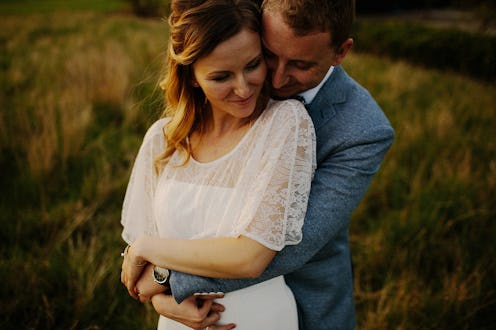Life
9 Signs Childhood Trauma May Affect Your Future Relationships
Everyone has a past, but if you're struggling with childhood trauma well into adulthood, it could signify a greater issue, especially when it comes to your relationships. The effects of childhood on future relationships can be pretty strong, so unless there's some sort of resolution, you might be faced with some nasty consequences, holding you back from finding love, acceptance, and growth.
As a certified health coach, I work with clients on feeling their absolute best selves, where they can feel comfortable and satisfied in their present and future relationships. A first step towards having this mindset is by overcoming any obstacles in your path, and those can often be found from childhood memories or the past. If you're noticing any limitations from things that happened when growing up, it's a good idea to speak with a therapist to address them and try and find an inner peace to move on. Once you've let go, you'll be able to focus all your energy on your present and future self, and be open to more that life has to offer (especially when it comes to friendship and love). Here are 9 signs your childhood damaged you for your future relationships.
1. You Have An Insecure Attachment Style To Parents
According to Mandy Kopplers, CBT therapist, over email with Bustle, if you grew up with an insecure attachment style, you'll be more phobic of relationships and restless. "Adults with insecure attachments tend to be emotionally volatile in relationships. Some even develop personality disorders with very rigid, black and white thinking about relationships and others. There are no grey areas and this has usually developed to compensate for fear of rejection or abandonment. Those with an insecure attachment tend to be hyper vigilant to any possible forms of rejection and/or abandonment," Kopplers adds.
2. You Make Present Day Decisions Based On Past Labels
"After being diagnosed with a debilitating illness, I discovered a great deal about myself. The main discovery was that I was making life decisions based on labels that were given to me, or that I accepted, in my youth," says LeeAnne Mendenhall, CPC over email with Bustle. "After shredding those labels, I was able to change my life completely and am currently blissfully happy with my new life," Mendenhall says.
3. You Can't Trust
According to Kimberly Hershenson, LMSW, over email with Bustle, if you can't trust in new relationships, it could mean you're holding onto issues from the past. "If you are afraid to open up to others, always afraid your partner is cheating on you and don't believe others when they tell you things these are all signs of trust issues. Instead, reframe from checking a partner's computer or phone for 'evidence' and try and be vulnerable with just one person in your life and see how that feels," Hershenson says.
4. You Are Mean To Others
"You put others down - when you're feeling anxious or upset you automatically start putting others down," says Hershenson. "This is a defense mechanism in order to make others 'feel as bad as you.' Instead, leave the room and try a deep breathing exercise to calm yourself down before lashing out," Hershenson recommends.
5. You Get Defensive To People
"If you say or do something wrong you don't apologize or if your friend is upset with, and you can't talk it out without getting defensive," it's a sign, says Hershenson. "Acknowledge what your part was (even if it was simply upsetting your friend) and discuss what you could do differently in the future," Hershenson recommends.
6. You Are The One Who Always Leaves
If you're always leaving relationships or withdrawing, it could mean you're stuck in the past from a childhood trauma, explains Elisabeth Manning, a fertile life coach, over email with Bustle. "If you look for reasons to leave, and you are always the one to break up consistently, it becomes a pattern," Manning says. This might be, "because you were abandoned by dad so subconsciously you need to abandon first, so as not to experience that pain of being left behind again."
7. You Demand Too Much From People
If this happens, "you weren't seen and honored as a child," says Manning. "You were cast aside or treated as a burden, and this unmet longing causes deep wounding that puts enormous pressure on not only a future partner but in future children as well," Manning advises.
8. You Can't Be Yourself
If you feel uneasy expressing your own thoughts and being your own type of person, it could mean you never got that acceptance you needed from childhood and are still looking for approval, says Manning. A sign: "You can't express your true feelings or even be yourself because you never had a real parent child relationship that encouraged exchange of feelings, or you were shut down or in an authoritarian parent child relationship," Manning notes.
9. Your Parent Had A Mental Illness
While this isn't always the case, if a parent had a mental illness, such as bipolar disorder, when you were growing up, you might've been exposed to volatile emotions or a tough, rocky atmosphere, and those could have repercussions, explains Diane Dweller, author of Mom, Mania, and Me, Surviving and Changing a Volatile Relationship over email with Bustle.
If you notice any of these emotions or behaviors in your relationships, or they resonate with your childhood, consider seeking a therapist for help overcoming these obstacles.
